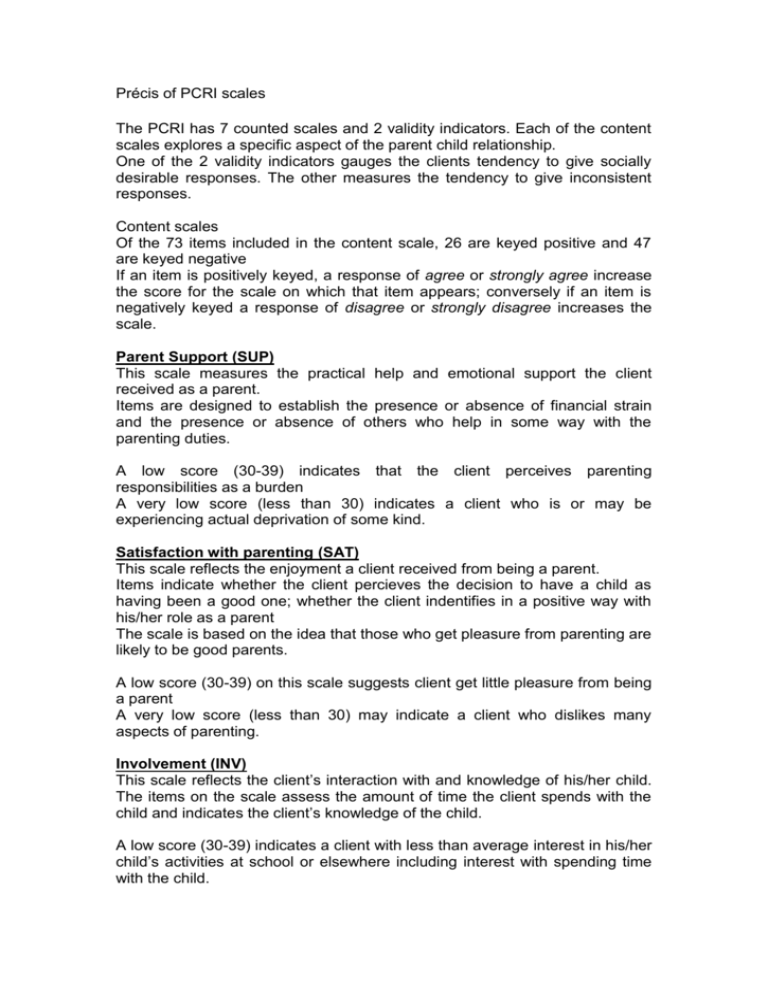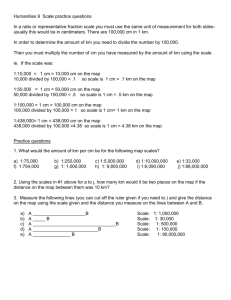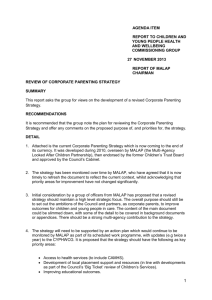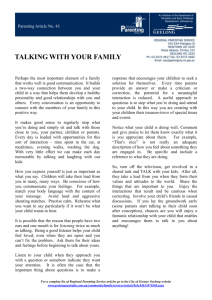PCRI precis
advertisement

Précis of PCRI scales The PCRI has 7 counted scales and 2 validity indicators. Each of the content scales explores a specific aspect of the parent child relationship. One of the 2 validity indicators gauges the clients tendency to give socially desirable responses. The other measures the tendency to give inconsistent responses. Content scales Of the 73 items included in the content scale, 26 are keyed positive and 47 are keyed negative If an item is positively keyed, a response of agree or strongly agree increase the score for the scale on which that item appears; conversely if an item is negatively keyed a response of disagree or strongly disagree increases the scale. Parent Support (SUP) This scale measures the practical help and emotional support the client received as a parent. Items are designed to establish the presence or absence of financial strain and the presence or absence of others who help in some way with the parenting duties. A low score (30-39) indicates that the client perceives parenting responsibilities as a burden A very low score (less than 30) indicates a client who is or may be experiencing actual deprivation of some kind. Satisfaction with parenting (SAT) This scale reflects the enjoyment a client received from being a parent. Items indicate whether the client percieves the decision to have a child as having been a good one; whether the client indentifies in a positive way with his/her role as a parent The scale is based on the idea that those who get pleasure from parenting are likely to be good parents. A low score (30-39) on this scale suggests client get little pleasure from being a parent A very low score (less than 30) may indicate a client who dislikes many aspects of parenting. Involvement (INV) This scale reflects the client’s interaction with and knowledge of his/her child. The items on the scale assess the amount of time the client spends with the child and indicates the client’s knowledge of the child. A low score (30-39) indicates a client with less than average interest in his/her child’s activities at school or elsewhere including interest with spending time with the child. A very low score (less than 30) suggest that the client may wish to avoid contact with the child and may reflect high levels of conflict and guilt Communication (COM) This scale represents clients’ awareness of how well they communicate with their children in a variety of situations including simple conversation. In measuring ability to talk with their children, the scale reflects empathy. A low score (30-39) indicates clients difficulty in talking to a child A very low score (less than 30) may indicate serious communications problems. Limit setting (LIM) This scale measures the clients’ effectiveness in setting and keeping boundaries in relation to their child’s behaviour. A low score (30-39) indicates that the client does not feel in control as a parent and has not established firm guidelines for the child. A very low score (less that 30) suggest situation at home is out of control. Autonomy (AUT) This scales measures the willingness of the client to promote their child’s independence as opposed to rigid control and monitoring. A low score (30-39) suggests that the client has difficulty accepting a child’s expression of age appropriate signs of independence A very low score (less that 30) indicates a serious problems with the control of the child and identification with the child. Role Orientation (ROL) This scale measures attitudes to parenting on a continuum from equal and shared parental responsibilities to more distinct roles for male and female carers. Low scores (below 40) indicate that the client has ‘traditional’ attitudes towards gender roles such as believing housekeeping and child rearing tasks belong chiefly to the female and that supporting the family be the responsibility of the male. The results of the PCRI will indicate the client’s perceived level of need as a percentile closely related to tiers of need. It may also highlight areas where particular trends of difficulty exist and facilitators may wish to take this into account within the programme (e.g. limit setting). The PCRI will also tell you when a client is inconsistent in their responses or wishes to be perceived in a particularly positive light.









